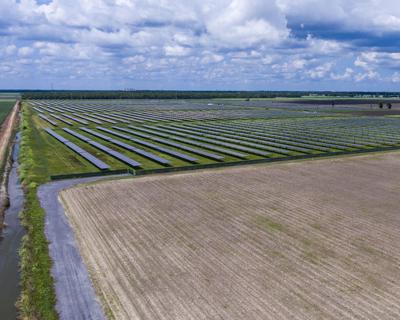A state district judge has upheld St. James Parish's decision last year to reject a 2,200-acre solar farm that would have added to Entergy Louisiana's renewable portfolio, finding the local government acted with "appropriate and well-founded concerns" about how the large facility would fit with the parish land-use plan.
The ruling on the Vacherie project, which would have been one of the largest solar farms in the state, comes as renewable projects face new headwinds under the Trump White House's scrutiny of billions of dollars in loans, grants and tax credits offered under the Biden administration to power the nation's transition away from fossil fuels.
Even before the new administration took power in January, though, solar and other renewable projects with big footprints or visual impacts have seen resistance from local governments across the nation.
In Louisiana in recent years, several parish governments have sought to slow things down until they could adopt their own land-use rules, though, unlike in St. James' case, many of those projects later were approved.
Demand for the facilities is being driven by new and existing industries looking for power with low or no carbon impact, Entergy and other company officials and economic analysts have said.
In a 21-page, point-by-point ruling, Judge Jason Verdigets found that developer D.E. Shaw Renewable Investments and Ten-R Company, the local landowner group, failed to prove that any of the eight reasons that the Parish Council had offered last June for rejecting the project were without good justification.
Verdigets, of the 23rd Judicial District Court, found the 4-3 council decision to reject DESRI's project was narrowly tailored and rationally tied to the solar farm's suitability with the land-use plan that calls for agriculture and future homes in the area.
Even after DESRI came back with a 40% smaller version from earlier plans with visual and big land buffers -- as well as a nearly $4.7 million community benefits package for local governments, education and recreation -- the judge found the council acted well within its legislative discretion.
"The council was empowered to turn down the proffered financial benefits of the application, when it felt the negative impact on the land-use pattern of the parish outweighed the benefits," Verdigets concluded.
He also rejected the idea that the council acted unreasonably in turning down the project when it had approved a 218-acre solar farm in the same area in 2019, saying the 2,200-acre project would be "radically different" in scale and the largest in the parish's history.
The solar farm would have sold 360 megawatts of power to Entergy Louisiana, generated $154.7 million in local taxes over 35 years and produced 400 temporary construction jobs with a $56.7 million payroll. 
Some St. James residents and parish officials had aired concerns about the visual impact of acres of solar panels, their potential effect on the sugar cane industry and whether a project with three permanent jobs was the best use of a large tract of land along the Mississippi River.
In an interview, parish land use attorney Victor Franckiewicz Jr. noted the judge's sweeping support for the parish's decision and the eight factors it used to justify the vote.
"He ruled in favor of the parish on every single point," Franckiewicz said.
Among those reasons were that large land buffers and a planned 12-foot-high bamboo screen were insufficient to hide the panels that could be 16 feet tall, that the solar project removed sugar cane land from production and traded its jobs for a few permanent ones, and that the project was targeted for land set aside for agriculture and homes when industrial tracts were available elsewhere in the parish.
"Thus, this industrial-style use is inconsistent with the parish's land use ordinance and comprehensive plan," Verdigets wrote. "So, while the facility would represent growth by the addition of physical structures, that is not the growth the parish seeks in their goals and objectives for Vacherie, as a matter of public policy."
It was not clear if DESRI and the landowners will appeal. A representative for DESRI said in a statement that the company is "disappointed in the decision" and "is currently evaluating options to advance our potential investment in St. James Parish."
"Solar is low-cost and locally generated power that supports our economy. We stand by this project,ÔÇŁ the company statement added.
An attorney for the landowner group did not immediately respond to a request for comment.
The landowners had filed a separate suit against the parish over the same issues and it was consolidated with the DESRI suit. Verdigets' ruling, which was signed Feb. 4, applied to both cases.
Several years ago, DESRI had originally proposed a much larger facility ÔÇö about 3,900 acres ÔÇö on some of the same sugar cane land, but the Planning Commission blocked it in 2022. The Parish Council then adopted a moratorium on solar farms until a new ordinance regulating those projects could be written.
Once the ordinance was created with DESRI's help, the developers came back in March 2024 with the 2,200-acre proposal with buffers, screening and other measures called for in the new ordinance, plus the incentive package.
The company had also done its own polling showing that 61% of residents in the parish were likely or very likely to support solar in St. James.
But, the new rules didn't create a solar farm use, so the project was proposed on agricultural and residential land for which DESRI would need an exception, giving the council discretionary power to weigh factors for and against.

